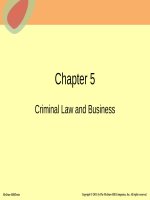- Trang chủ >>
- Thạc sĩ - Cao học >>
- Luật
Lecture Dynamic business law, the essentials (2/e) - Chapter 22: Corporations: Formation and organization
Bạn đang xem bản rút gọn của tài liệu. Xem và tải ngay bản đầy đủ của tài liệu tại đây (244.7 KB, 33 trang )
Chapter 22
Corporations: Formation and
Organization
McGrawHill/Irwin
Copyright © 2013 by The McGrawHill Companies, Inc. All rights reserved.
Characteristics of Corporations
• Legal entity
• Rights as person and citizen
• Creature of state
• Limited liability of
shareholders
• Unrestricted transferability
of corporate shares
• Perpetual existence
• Centralized management
• Corporate taxation
• Liability for Officers and
Employees
222
Corporate Powers
• Corporations have both “express” and “implied” powers
-Express Powers: Perpetual existence; right to litigate;
right to make contracts; right to borrow/loan money; right
to make charitable donations; ability to establish rules for
managing corporation
-Implied Powers: Whatever actions necessary (within the
law) to execute express powers
• “Ultra Vires” Act: Corporate action beyond scope of
corporation’s authority (i.e., beyond its express and implied
powers)
223
Classifications of Corporations
• Public/Private
• For-Profit/Non-Profit
• Domestic/Foreign/Alien
• Publicly Held/Closely Held
• S-Corporation
• Professional Corporation
224
Public Versus Private Corporation
• Public Corporation: Corporation created by government
to administer law, with specific government duties to fulfill
-Example: Federal Deposit Insurance Corporation
(FDIC)
• Private Corporation: Corporation created for private
purposes
225
For-Profit Versus Non-Profit
Corporations
• For-Profit Corporation: Objective is to operate for profit;
shareholders seeking to make profit purchase stock these
corporations issue
• Non-Profit Corporation: May earn profits, but they do not
distribute these profits to shareholders (non-profit
corporation does not issue stock, nor does it have
shareholders); instead, corporation reinvests profits in
business
226
Domestic, Foreign, and Alien
Corporations
• Domestic Corporation: Doing business within state of
incorporation
• Foreign Corporation: Doing business in states other
than state of incorporation
• Alien Corporation: Doing business country other than
country of incorporation
227
Publicly Held Versus Closely Held
Corporation
• Publicly Held Corporation:
-Stock available to public
• Closely Held Corporation (a.k.a. “Close”,
“Family”, “Privately Held” Corporation):
-Generally does not offer stock to public
228
“Subchapter S” Corporation
• Named after provision of Internal Revenue
Service (IRS) code that provides for it
• Particular type of closely held corporation (no
more than one hundred shareholders)
• Combines advantages of limited liability and
single taxation
229
Formation of Corporation
• Promoters organize corporate formation
• Subscribers offer to purchase stock in corporation
in formation process
• State selected for incorporation
2210
Questions to Consider in Selecting a
State For Incorporation
• How much flexibility does the state grant to corporate
management?
• What rights do state statutes give to shareholders?
• What restrictions does the state place on the
distribution of dividends?
• Does the state offer any kind of protection against
takeovers?
2211
Legal Process of Incorporation
• Selection of corporate name
• Drafting and filing articles of incorporation
• First organizational meeting held
2212
Remedies For Defective Incorporation:
• “De jure” corporation: Lawful corporation that has met the
substantial elements of incorporation process
• “De facto” corporation: Corporation that has not met the
requirements of state incorporation statute, but courts recognize it
as a corporation for most purposes to avoid unfairness to third
parties who reasonably believed it was properly incorporated
• Corporation by estoppel: Corporation prevented by court from
denying its corporate status
• Piercing corporate veil: Shareholders personally liable when they
have used corporation to engage in illegal/wrongful acts
2213
Situations When Courts Likely To
Pierce Corporate Veil
• Corporation lacked adequate capital when initially formed
• Corporation did not follow statutory mandates regarding
corporate business
• Shareholders’ personal interests and corporate interests
are commingled (corporation has no separate identity)
• Shareholders attempt to commit fraud through
corporation
2214
Debt Securities Versus Equity
Securities
• Debt Securities: Bonds (representing loans to
corporation from another party)
• Equity Securities: Stock
2215
Equity Securities: Preferred Stock
Versus Common Stock
• Preferred Stock: Stockholder enjoys
preferences regarding assets and dividends
• Common Stock: Stockholder owns portion of
corporation, but no preferences regarding
assets and dividends
2216
Corporate Directors, Officers,
and Shareholders
2217
Summary of Roles of Directors, Officers, and
Shareholders
• Directors--
•
•
•
•
• Officers--
•
•
• Shareholders--
•
•
Vote on important corporate
decisions
Appoint and supervise officers
Make financial decisions
Manage corporation
Run “day-to-day” business of
firm
Agents of corporation
Elect board of directors
Approve major corporate
decisions
2218
Fiduciary Duties
Definition: Duties to corporation that individuals
within corporation have
Primary fiduciary duties include:
• Duty of Care
• Duty of Loyalty
• Duty to Disclose Conflict of Interest
2219
Business Judgment Rule
Definition: Provides that directors and officers are
not liable for decisions that harm corporation if
they were acting in good faith at time of decision
2220
Corporations: Directors, Officers, and
Shareholders--Other Relevant Terminology
• Stock-Subscription Agreement: Contractually obliges
individual to buy shares in corporation
• Par-Value Shares: Fixed face value noted on stock certificate
• No-Par Shares: Stock shares without a par value
• Watered Stock: Stock issued to individuals at a value below
fair market value.
• Pre-emptive Rights: Preferential rights given to existing
shareholders to purchase shares of new stock issue;
preference given in proportion to percentage of stock
shareholder already owns
2221
Corporations: Directors, Officers, and Shareholders-Other Relevant Terminology (Continued):
• Stock Warrants: Vouchers issued to shareholders, entitling
them to given number of shares at specified price
• Inspection Rights: Protect shareholders’ interests by giving
them right to inspect corporation’s books and records after
asking in advance to inspect and having proper purpose
• Right of First Refusal: Given to existing shareholders to
purchase any shares of stock offered for resale by shareholder
within specified period of time
• Shareholder’s Derivative Suit: Filed by corporate shareholder
when corporate directors fail to sue in situation where
corporation has been harmed by individual/another corporation
2222
Summary of Rights of Directors, Officers, and Shareholders
•
Directors--
•
•
•
•
Right to Compensation
Right to Participation
Right to Inspection
Right to Indemnification
•
Officers--
•
Rights determined in employment
contract
•
Shareholders--
•
•
•
•
•
•
•
•
Stock certificates
Preemptive rights
Right to Dividends
Right to Transfer Shares
Inspection Rights
Right to Corporate Dissolution
Right to File Derivative Suit
Right to File Direct Suit
2223
Mergers and Consolidations
2224
Merger
Definition: A legal contract combining two or more
corporations such that only one of the
corporations continues to exist; in essence, one
corporation “absorbs” another corporation
2225









